UK Imposes Sanctions On Iran Over Protests Crackdown

Britain has slapped a new round of sanctions on 24 Iranian officials who played a role in cracking down on protests after the death of Mahsa Amini in police custody.

Britain has slapped a new round of sanctions on 24 Iranian officials who played a role in cracking down on protests after the death of Mahsa Amini in police custody.
In a press release on Monday the United Kingdom announced the “sanctions target officials within the Iranian regime who are responsible for heinous human rights violations.”
British Foreign Secretary James Cleverly stated that by these sanctions the UK and its partners have sent a “clear message” to the Iranian regime that “the violent crackdown on protests must stop and freedom of expression must be respected.”
The Foreign Secretary expressed that Britain designates Iran’s Communications Minister Issa Zarepour as well as a number of law enforcement agents and IRGC officials who ordered and been involved in the clampdown on demonstrators.
The British foreign office further noted that Chief of Iran’s Cyber Police, Vahid Mohammad Naser Majid, will be targeted due to the internet shutdown and “disabling WhatsApp and Instagram, and banning the use of the Google Play app and virtual private networks (VPNs).”
Governor of Sistan and Baluchestan as well as Kordestan have also been sanctioned due to massacre of 80 people on September 30 in Zahedan and heavy crackdown on Kurdish protesters.
The name of Chief of Tehran Police could also be seen in the list. Hossein Rahimi is sanctioned for using live rounds and tear gas against students at Sharif University in Tehran.
The sanctions include asset freezes and travel bans.
Meanwhile, the European Union also approved a new round of sanctions Monday against 29 individuals and three entities with asset freezes and travel bans.
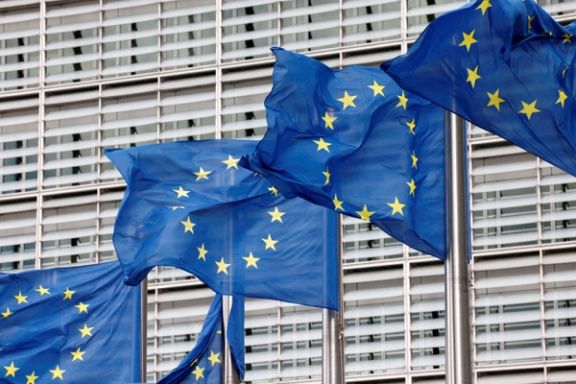
The European Union sanctioned 29 Iranians and three entities Monday over what it said was human rights violations related to suppression of ongoing protests.
A statement issued in Brussels, where foreign ministers met, said the move was over “their role in the death of Mahsa Amini and the violent response to the recent demonstrations in Iran.”
Among the 29 named were Enayatollah Rafiei, Ali Enayatollah, Fatemeh Ghorban-Hosseini, and Parastou Safari, who the EU said were the “squad that arbitrarily arrested” Amini, who died September 16 after receiving fatal head blows in custody of Tehran ‘morality police.’
Also sanctioned, for “their role in the brutal repression of the recent protests,” were Iran’s Minister of Interior Ahmad Vahidi, Major-General Hossein Salami, commander of the Islamic Revolutionary Guards Corps (IRGC), and Brigadier General Major-General Kiumars Haydari, commander of the army’s ground forces. Added to the list were several provincial heads of the Iranian Law Enforcement Forces (LEF) and Basij, mainly in the majority-Sunni Kurdish and Baluchi regions where most unrest and violence have occurred.
Press TV, the English-language state television station, was designated “for producing and broadcasting the forced confessions of detainees,” along with Vahid Mohammad Naser Majid, head of the cyber-police, and the Bonyad-eh Taavon-eh Basij, a cooperative foundation linked to the Basij.
The measures involve a ban on entering the EU, the seizure of any assets in the EU, and a prohibition on EU citizens or businesses making funds available to those designated. The EU statement said it had now listed 126 people and 11 entities over human rights violations in Iran.
The “use of force against peaceful protestors” was “unjustifiable and unacceptable,” the EU said, as “people in Iran, as anywhere else, have the right to peacefully protest…” The statement called for the death of Amini to be “investigated in an independent and transparent manner and any[one] proved responsible for her death…held accountable.”
‘A clear message’
Germany’s Foreign Minister Annalena Baerbock told reporters that the new sanctions would “send a clear message to those who think they can suppress, intimidate and kill their own people without consequences.”
EU-Iran relations have soured in recent months, with European leaders vocal both over protests in Iran and Russia’s use of Iranian-made drones in Ukraine. French President Monday spoke Monday of a ‘new framework’ for regional security given the continuing failure of 18-month talks to revive the 2015 Iran nuclear agreement, the JCPOA (Joint Comprehensive Plan of Action).
As a further sign of the ‘E3’ signatories of the JCPOA – France, Germany, and the United Kingdom – moving closer to the US, the E3 is preparing a second resolution, following one in June, at this week’s quarterly board of the International Atomic Energy Agency (IAEA) condemning Iran over what the IAEA has said is a lack of cooperation with the agency.
Iran’s foreign affairs spokesman Nasser Kanaani said Monday the US and E3 were “again trying to use the agency politically and turn it into a vehicle for political pressure on the Islamic Republic of Iran.” Kanaani pointed to the scheduled visit this month of IAEA officials to discuss the outstanding issue of uranium traces found in sites linked to Tehran’s pre-2003 nuclear work, but US State Department Spokesman Ned Price last week said Iran was “foot-dragging.”
The UK also Monday announced new sanctions against Iran over “violent repression of protests.” Those named included cyber-police chief Majid, and the Communications Minister Issa Zarepour.

Many are criticizing Iran’s Sunni leader Molavi Abdolhamid for meeting with the Ali Khamenei's envoy despite the killing of many protesters in his native region.
“Molavi Abdolhamid made the greatest mistake if he met with Khamenei’s envoy. It’s totally unacceptable,” one of the many who criticized Abdolhamid for meeting with Mohammad-Javad Haj-Aliakbari tweeted before local sources confirmed that the meeting had taken place.
“Tell him they [security forces] were busy arresting Baluchis while he was speaking with Khamenei’s envoy. They killed two people for no reason just yesterday,” another twitterati retorted.
Molavi Abdolhamid, the leader of Iran’s largely Sunni Baluch population in the southeastern province of Sistan and Baluchestan and other local Sunni leaders met with Haj-Aliakbari and his accompanying delegation at the private residence of a local community leader in Zahedan Sunday.
State media said Haj-Ali Akbari was carrying “Supreme Leader’s greetings to the people of Sistan and Baluchestan” and to let them know that the recent events in the province have “saddened and upset him”.
However, what some media in Tehran reported about Haj-Ali Akbari’s statements, showed that his remarks had double meaning. At the same time that he spoke about resolving misunderstandings, he also said that he delivered “serious messages to Some” to be careful about their behavior.
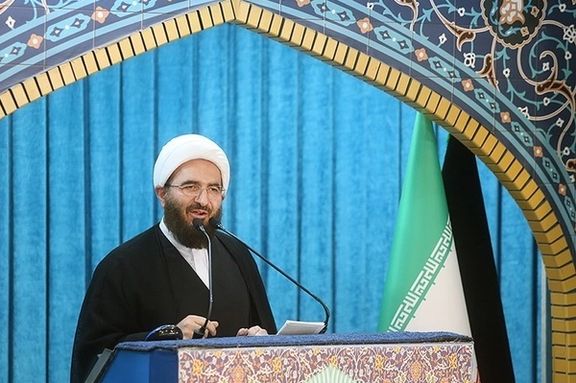
Abdolhamid has strongly criticized the authorities and said he holds Khamenei responsible for the violence against Sunni Baluchis and other protesters.
Haj Aliakbari who is one of Tehran’s interim Friday imams also heads the Policymaking Council of Prayer Leaders which sets the agenda for state-sponsored Friday sermons across the country.
Amnesty International said on November 10 it had recorded the names of at least 100 protesters and bystanders including sixteen children who were killed by security forces in Sistan and Baluchestan Province since September 30 but believes the real number is much higher.
Official media say four Revolutionary Guards (IRGC) forces as well as 35 protesters and bystanders were killed in Zahedan on September 30.
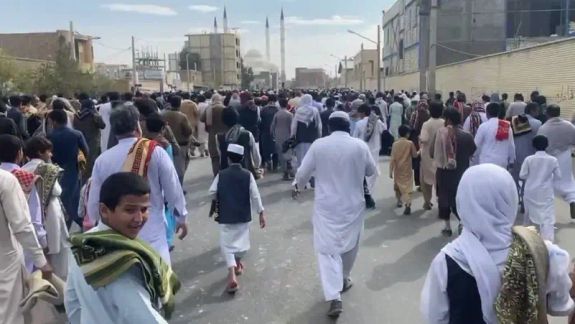
According to his official website, Abdolhamid said in the meeting with Khamenei’s envoy that the recent events were the outcome of “discrimination against the Sunni community”.
He added that on September 30, the deadliest day of the crackdown on protesters, security forces had fired live ammunition at peaceful protesters in Zahedan and insisted that the attack was unprovoked. Protesters who threw stones at a police station before they were shot did not intend to seize the station and there were no militants amongst them as claimed by the authorities, he said.
The IRGC-linked media called the killing of protesters in Zahedan, widely referred to as “Bloody Friday” on social media, “a terrorist plot” and blamed Jaish ul-Adl Salafi jihadist group, but the group denied any responsibility.
“If these claims were true at least several security forces would have been killed or wounded [during the September 30 crackdown]. But around 100 ordinary people were shot dead inside the prayer grounds and the bullets mainly hit their heads and chests.”
He also pointed out that security forces had fired live ammunition at protesters who were pelting the local governor’s office in Khash, another city in the Baluch part of the province on November 4.At least 18 protesters and bystanders, including two children, were killed in Khash.
Referring to security forces killed in the restive province in the past few weeks, Haj-Aliakbari lauded “security-defending martyrs” in his meeting with Abolhamid and other local leaders but also said Khamenei considers the locals who were killed “innocently, as a result of human error, or in other ways” as “martyrs”.
Khamenei’s envoy also said those arrested “whose crimes were small” will soon be pardoned by Khamenei but others will be dealt with “justly and decisively … so that such incidents won’t happen again” and blamed “those outside the country” for taking advantage of the situation in the restive province and accusing the people of the province of “separatism”.
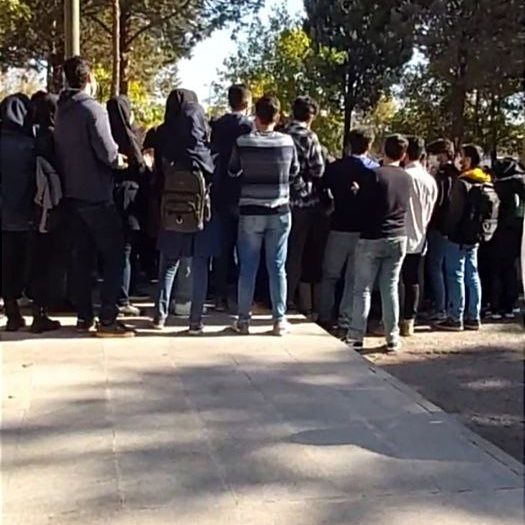
Student antigovernment protest movement in Iran continued Monday with university and school students expressing solidarity with their detained colleagues.
Almost two months into the uprising of against the clerical rulers, gatherings, sit-ins and demonstrations continued at campuses.
Schoolchildren across the country also kept their protest actions to show anger at restrictions and violence by the government.
In University of Qazvin near Tehran students chanted the name of political activist Hossein Ronaghi who is in custody suffering from health issues.
At Sharif University in Tehran, students staged a sit-in to protest arrests and bans on their peers.
Student Councils Union reported that 19 students at Tabriz University of Arts in northwest Iran have been banned from entering the campus and security forces are checking the students' ID cards at the entrance of the university.
A video received by Iran International shows some schoolgirls in Esfahan chanting slogans in front of the prayer Imam of the school, saying “You are a whore, I am a free woman.”
In recent weeks, university students have been holding demonstrations on campuses, demanding the end of repression in society and the university.
Also, acts of civil disobedience and protests continued at schools despite the efforts of the security forces to stop the teenagers.
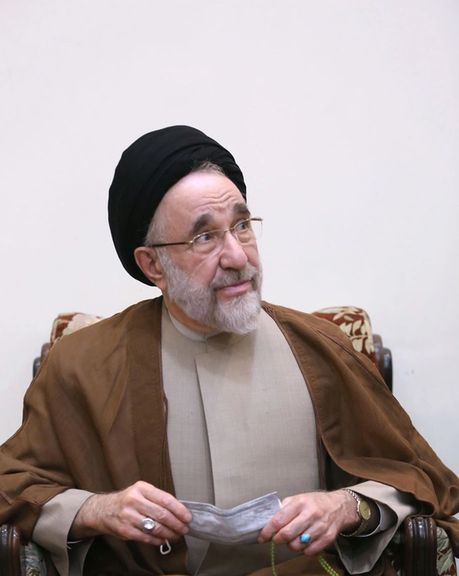
Amid ongoing antigovernment protests, former president and the de-facto leader of Iran’s reformists Mohammad Khatami has spoken against regime change, calling it neither possible nor desirable.
In a message on Monday, the Khatami noted, however, that if the current state of affairs continues, the ground is paved for a looming social collapse.
Expressing regret over the death of "tens of people, many of whom are children and adolescents,” he said the root cause of these “bitter events” is from inside the country, rejecting the official line of Islamic Republic’s propaganda that blames other countries for fomenting the protests.
The current situation is the result of a faulty and incorrect governance mechanism, Khatami noted.
He debunked another claim by the clerical regime that seeks to portray the current wave of protests ignited by the death in custody of Mahsa Amini as fueled by ethnic or religious rivalries and aimed at the balkanization of Iran. “Although the protests started with the unfortunate death of Mahsa Amini (a Kurd), they did not take on an ethnic or religious tone and no separatist voice was heard from it,” he said.
“Ignoring or denying the bad situation that is imposed on people…does not eliminate dissatisfaction,” Khatami said. Misrepresenting the protests as “riots” to justify a harsh response only aggravates the problem, he added.
Earlier in the month, both supporters and opponents criticized Iran’s embattled Reform Front for a statement it issued presenting a double-edged position over current protests.
In October, the spokesman for Iran’s Reform Front, Abolfazl Shakouri-Rad, said a bipolar situation has taken shape in Iranian politics and reformists have been left out of the political debate by both the hardline government and the protesters who do not want an Islamic government.
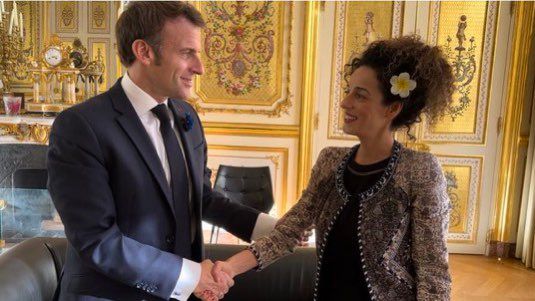
President Emmanuel Macron said Monday that reviving the 2015 Iran nuclear deal was unlikely and that a regional conference should be called by year end.
France has long supported the 2015 agreement, the JCPOA (Joint Comprehensive Plan of Action) as a step towards regional agreements over other issues, including defense, security, and trade. But speaking to France Inter radio Monday, Macron said he hoped to establish a “new framework” involving regional powers, including Iran, that was probably now needed, and that he was “very cautious” over prospects for restoring the JCPOA.
Macron suggested current unrest in Iran, which he characterized Saturday as a “revolution,” had “fragilized” the 2015 agreement, which the United States left in 2018, leading Iran after 2019 to expand its nuclear program beyond JCPOA limits.
The French president was criticized Sunday by Iran’s foreign affairs spokesman for meeting with overseas Iranian opposition activists, including US-based Masih Alinejad, who is prominent in social media and more recently on US and other media networks.
Nasser Kanaani called Macron’s comments after the meeting – which encouraged Alinejad to praise France as “the first country to officially recognize this revolution” – “a flagrant violation of France’s international responsibilities in the fight against terrorism and violence.”
Iran has been presenting the protests as "riots" and some protesters as "terrorists". It has already sentenced one protester to death for allegedly attacking a government building.
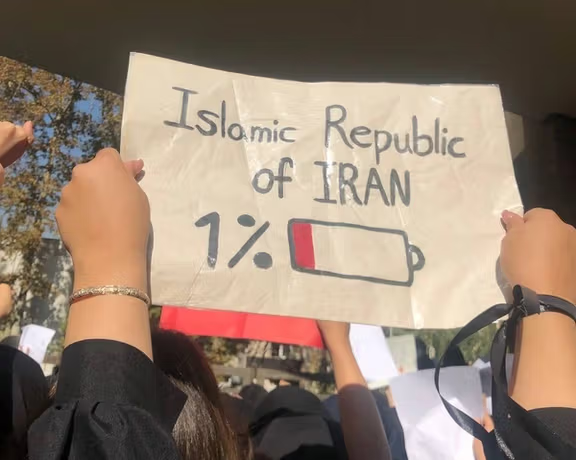
Although around 40 security forces have been killed during protests since September, more than 330 demonstrators have died mostly by bullets of regime’s official and unofficial gunmen.
While the logic of the JCPOA separated Iran’s nuclear program from other issues, the distinction has become harder to maintain given international publicity of protests following the September 16 death of a 22-year-old woman in the custody of Tehran ‘morality police.’
So far, the US and three European JCPOA signatories – France, Germany and the United Kingdom – have said they are committed to reviving the agreement, and that the failure of 18-month talks is due solely to Iran making demands beyond the original agreement. Meetings are due in Tehran later this month as International Atomic Energy Agency seeks what it deems satisfactory answers over uranium traces found in sites linked to Iran’s pre-2003 nuclear work. Iranian officials, including President Ebrahim Raisi, have said the IAEA probe into the matter should be dropped in order to revive the JCPOA.
Dim prospects?
Prospects for a regional conference – Macron’s proposed ‘new framework’ – appear dim, and the French president did not specify who should be involved. Multilateral efforts to end the war in Yemen, or the violent fragmentation of Syria, have floundered.
Iran and Saudi Arabia, despite Iraq-brokered talks, have not restored diplomatic relations broken off 2016 after Riyadh executed leading Shia cleric Nimr al-Nimr, and most Arab states hold the Arab League position that Israel should not be recognized until it accepts a viable Palestinian state. Russia, ostracized by the US and European Union over Ukraine, coordinates oil policy with Saudi Arabia and has military cooperation with Iran.
Macron clearly did not accept Alinejad’s view that diplomatic relations with Iran be broken off and established instead withwhat she called “the Iranian opposition.” Alinejad has also organized a petition calling for the removalof Rob Malley, the US official who has led talks aimed at JCPOA restoration.
European Union foreign ministers meeting today in Brussels are expected to impose new sanctions on Iran– with Macron telling France Inter radio he was among those pushing for measures against leading officials and the Islamic Revolutionary Guard Corps (IRGC). US spokesman Ned Price said last week that while Washington was “looking at all appropriate tools” for dealing with Iran’s “foot-dragging,” it was already “very heavily sanctioned, to say the least…”